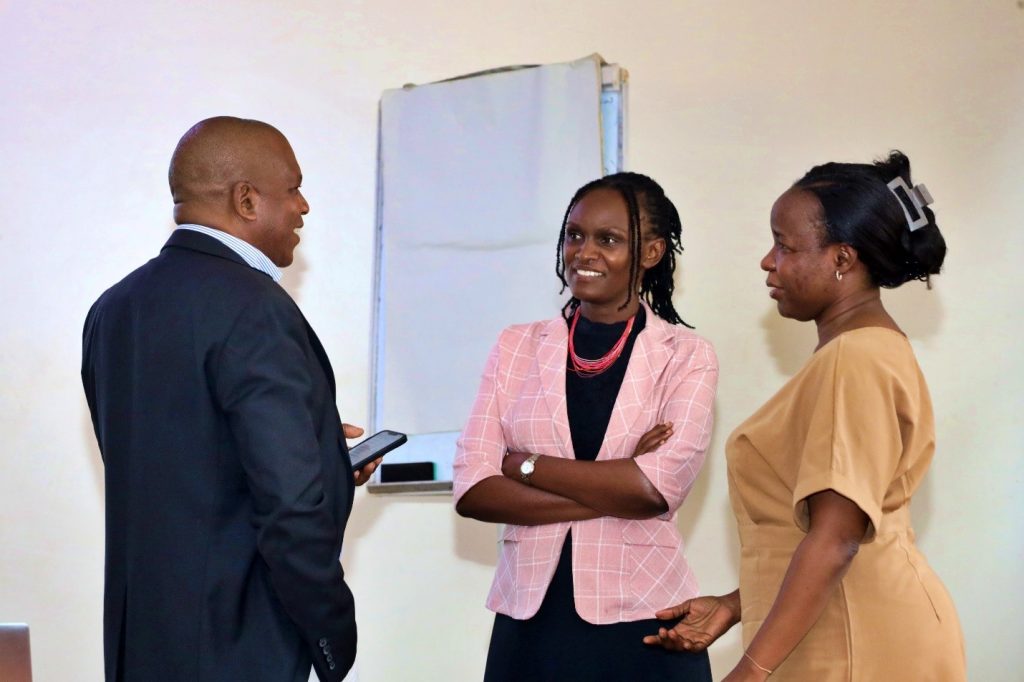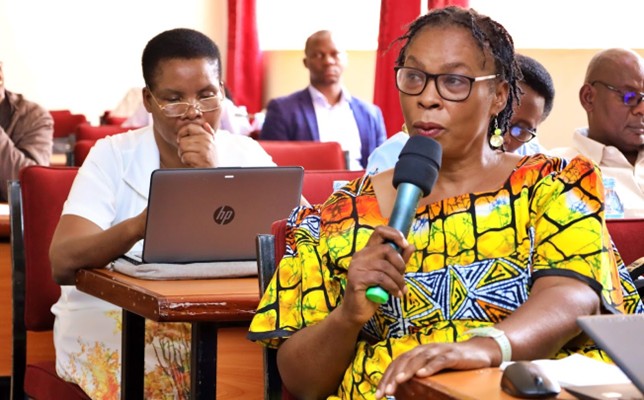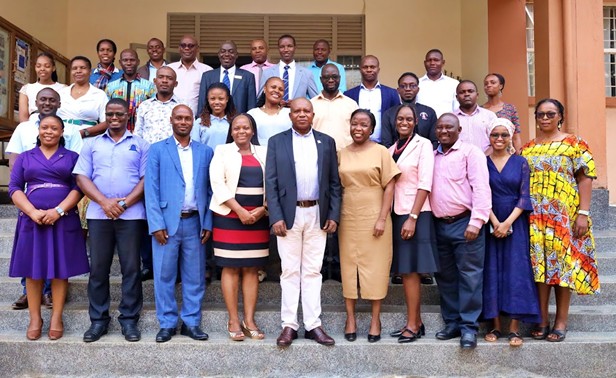Kyambogo University, in its role as a regional hub for the global AgriFoSe2030 Programme, hosted a key workshop focusing on developing a Theory of Change (ToC) for its institutionalization. The initiative aims to strengthen the university’s capacity to translate agricultural research into practical, impactful solutions for food security. This was A platform for the engagement between the AgriFoSe consortium partners comprised of three Swedish universities and on Institute (Swedish University of Agricultural Sciences, Linköping University, Lund University, Stockholm Environment Institute) and Kyambogo University (AgriFoSe regional hub).
Held on 15th August 2025 at the NPT Conference Room, the workshop convened Deans, Researchers, and Students from partner institutions, including Gulu University and Makerere University. The Others attending online included University of Gondor Ethiopia, Chinhoyi University of Technology Zimbabwe, Moshi Cooperative University Tanzania, Institute of Rural Development Nazi BONI University, Burkina Faso and Gulu University.

The AgroFose phase 2 extension, will build on lessons, experiences, and success stories of phase 1 and 2 with the aim to produce high-quality, policy and practice-relevant knowledge syntheses and analysis on smallholder farming systems, tailored for key actors; establish and foster structured platforms, research exchanges, and knowledge networks to connect scientists, practitioners, policymakers, and other stakeholders for innovative knowledge exchange and action at multiple scales; Train and build capacity of researchers and other stakeholders through exchanges, courses, and workshops in order to increase the capacity of scientists to synthesize, analyze, and communicate science with different stakeholders.
Dr. Judith Irene Nagasha, the host and the AgriFoSe2030 Programme Hub Leader, in her remarks outlined the core mission of the AgriFoSe2030 for Kyambogo University Hub (KyUH). She emphasized the need for researchers to move beyond traditional academic publications and actively engage with policymakers and practitioners. We are trying to get past the cycle of publishing findings that end up forgotten on a shelf.
She highlighted the importance of the ToC process, which provides a clear roadmap for how research activities will lead to long-term change. This strategic approach will guide the hub’s efforts in establishing its organizational structure, implementing change projects, and coordinating its activities across a network of partner universities.
One of the hub’s flagship initiatives is a project in the Kiruhura District, which empowers women and youth by integrating biogas technology into milk value addition. Another flagship project at Makerere University, led by Prof. Frank Muggaga is about the unlocking the potential of Kasese smallholder framers’’ urban food systems resilience for food security.
The Vice Chancellor represented by Dr. Eng. Nakagiri Anne, underscored the university’s full support for the initiative. Dr. Nakagiri noted that the AgriFoSe project aligns perfectly with Kyambogo University’s strategic focus on research. She also announced the establishment of a new Grants Office, which she leads, to support researchers in securing funding and managing impactful projects. Furthermore, she revealed that the university is in the final stages of developing its first University Research Statement. This statement will provide a foundational framework for all research activities, with the ToC approach serving as a key element for institutionalizing an impact-oriented research agenda.

At the end of AgriFose phase 3, there will be successful migration of AgriFoSe functions and activities to regional hub universities and partner institutions, demonstrating institutional capacity building and reduced reliance on external support. There will be established networks of regional hubs supporting partner universities, effectively addressing challenges faced by young scientists and fostering collaboration and knowledge exchange.
The workshop’s focus on bridging the gap between academia and society is a direct response to a major challenge facing many developing nations. The collaborative research and training planned through the AgriFoSe hub are designed to unlock opportunities for inclusive agricultural transformation, improve livelihoods, and build resilience against climate change.
Tags: African universities, agricultural innovation, agricultural research, AgriFoSe2030, biogas technology, capacity building, climate change resilience, food security, knowledge exchange, Kyambogo University, smallholder farmers, sustainability, Swedish universities, Theory of Change


Alright fellas, just hopped over to ok789 and gotta say, they’ve got a decent spread of games! Nothing groundbreaking, but definitely something to scratch that itch when you’re bored. Could use a few more promotions, but the site’s smooth. Check it out for yourself: ok789
Erleben Sie die Spannung und das Abenteuer, das die Schwesterseiten von Go Fish Casino bieten. Die Schwesterseiten von Go Fish Casino sind
bekannt für ihre Benutzerfreundlichkeit und schnellen Auszahlungen, was sie zu einer bevorzugten Wahl für deutsche Glücksspieler macht.
Diese Casinos bieten eine breite Palette von Spielen, die sowohl Anfänger als auch erfahrene Spieler
begeistern werden. Go Fish Casino bietet eine spannende Auswahl an Spielen von renommierten Anbietern wie Betsoft und Vivo Gaming.
Die Verwendung von Kryptowährungen bietet außerdem ein hohes
Maß an Spielervertrauen, da Transaktionen nicht über Drittparteien laufen. Nachdem Sie diese Informationen eingegeben haben, erhalten Sie eine Bestätigungsmail an Ihre angegebene E-Mail-Adresse.
Neben diesen klassischen Slots gibt es auch eine Vielzahl von Tischspielen wie Blackjack,
Roulette und Baccarat, die von erfahrenen Spielern geschätzt werden. Außerdem
ist die mobile Erfahrung auf der Website sehr flüssig und ermöglicht es Spielern, überall ihre
Lieblingsspiele zu spielen. Die Expertise der Kundensupport-Mitarbeiter ist bemerkenswert, auch wenn es nur in begrenzten Zeiten Live-Chat-Angebote gibt.
References:
https://online-spielhallen.de/sofortiger-kasino-login-ihr-direkteinstieg-ins-glucksspielvergnugen/
Elevate your Sydney nights with world-class performances, high-end
bars, harbourfront lounges, and unforgettable experiences available exclusively at
Crown Sydney. Crown Sydney boasts an extraordinary selection of restaurants, bars,
and lounges — from globally acclaimed chefs to relaxed waterfront
cafés and upscale cocktail venues with harbour
views. Stay in the Crown Sydney Tower — Australia’s tallest hotel — featuring
panoramic views, bespoke suites, and unrivalled service.
Located on Sydney’s exclusive waterfront, Crown delivers stunning views and
direct access to the city’s top cultural and business attractions.
Crown Sydney is located in Barangaroo, at 1 Barangaroo Avenue, Sydney, NSW.
Every area of Crown Sydney is designed for accessibility — including lifts, ramps,
accessible suites, and trained staff assistance. Crown is also accessible by boat from nearby Barangaroo Wharf or via helipad transfers by
request. With secure underground parking, valet service,
and limousine or private car arrangements,
arrival and departure are seamless. Guests can also join personal
training sessions or guided yoga overlooking the harbour.
It’s the ultimate setting for memorable sunsets, photos, or a
luxury cocktail evening. From private tasting
menus with celebrity chefs to rooftop poolside events and high-limit gaming soirées, Crown Sydney
curates unforgettable moments for its elite guests.
Offering panoramic views of Sydney Harbour and the city skyline,
each suite is meticulously designed with modern artistry, Italian marble bathrooms, and intuitive in-room technology.
Patrons have access to trained support personnel, voluntary limits, and exclusion options to
maintain healthy play habits. Crown Sydney is licensed and regulated by the NSW
Independent Casino Commission and adheres to the strictest standards of responsible gaming.
Although Crown Sydney does not feature a physical poker room, Crown Online
players can access a thriving global poker network via app or desktop.
References:
https://blackcoin.co/two-handed-pinochle-poker-professional-tips-for-playing-and-winning/
This will give you the best chance of earning back the bonus.
I wouldn’t suggest you play just to climb the VIP ladder, but
the VIP rewards come in handy along the way.
My favourite of all is the cashback bonus.
We advise you to read the terms and conditions of each casino
before using it. You need to know that deposit methods and withdrawal are not always the same.
But we got your back, so you won’t have to go too far
to find the casino of your dreams.
Okay, this isn’t really news, but it still may be news to someone.
Online gambling is no longer just about spinning the
reels or busting on blackjack. Neospin offers 20% cashback.
Top that off with a high $45,000 monthly withdrawal limit,
and you’ve got an AU casino site that does great all-around.
References:
https://blackcoin.co/pullman-reef-hotel-casino-5-star-experience/
casino sites that accept paypal
References:
empleosrapidos.com
online casino real money paypal
References:
https://bluestreammarketing.com.co/employer/paypal-casinos-uk-online-casinos-that-accept-paypal-deposits-2025
Yo, I heard about xjwinbet from a friend. Seemed alright. I didn’t win big, but didn’t lose either. Worth a punt if you’re feeling lucky. Head over to xjwinbet and see what you think.
Yo, anyone heard anything good about 23bet8? Odds any good? Variety of games/sports to bet on? Just curious if it’s worth checkin’ out. 23bet8